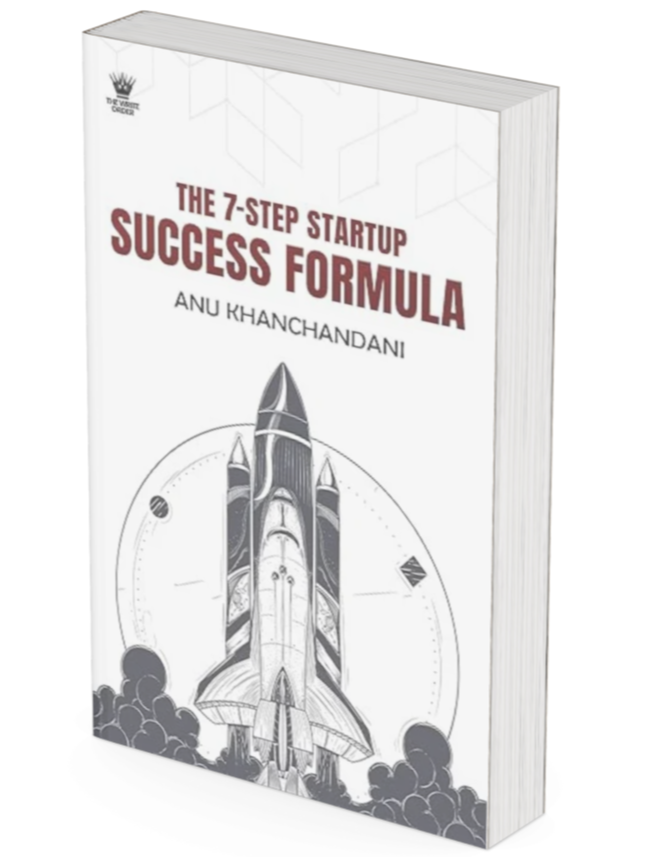Rejecting $3 Billion: SnapChat's Bold Decision
|
|
Thank you for Signing Up |



THE 7-STEP STARTUP SUCCESS FORMULA - DR. ANU KHANCHANDANI
Every entrepreneur’s journey is a mix of failures and successes. The probability of failure is higher, however, there is a way to grow and keep growing until you build a successful startup. This book is one such guide to help you with 7 formulas for your success.
TRANSCRIPT
Hi! Welcome to the Startup Mantras Podcast. This is Anu Khanchandani – Engineer, Entrepreneur, Startup Coach for the past 25 years.I’m here to share valuable lessons for Startups in terms of success and failure stories, processes, tools and techniques, which can be applied by Startup Founders in various aspects of their Startup Journey.
Story
Cool! So we made it to Episode # 2.
This one is going to blow you over! What if I would tell you that I would give you $3 Billion for your Startup, knowing fully well that your Startup still doesn’t generate revenue, nor has immediate defined plans to do so?
First, you might think I am speaking hypothetically and second you might think I am a person with no business sense whatsoever.
Well, it really happened. And this happened between none other than Mark Zuckerburg and Evan Spiegel, the founder of SnapChat long back in 2013/14.
For those of you who are not aware, SnapChat was a photo/message app which had a primary feature that pictures and messages are usually only available for a short time before they become inaccessible to their recipients.
In 2011, Evan Spiegel, Reggie Brown, and Bobby Murphy, three friends from college were discussing Entrepreneurship. During a casual chat Reggie said, “I wish these photos I am sending this girl would disappear.”
Evan saw it as a ‘million dollar idea.’ They worked on the app and launched in the name of Picaboo. But later after a fall out with Reggie, Evan and Bobby changed the name to Snapchat.
Barely a few months after it was launched and reached the milestone of 100,000 users, Mark Zuckerberg approached Evan with the message “Come to Menlo Park and let’s get to know each other”. To which, hold your breath, Evan replied “I’m happy to meet you… if you come to me.”
And what’s more – Zuckerberg flew to Spiegel’s hometown, Los Angeles. He arranged for a private apartment to host the secret sit-down. When Spiegel showed up with his cofounder Bobby Murphy, who serves as Snapchat’s chief technology officer, Zuckerberg had a specific agenda ready. He described Facebook’s new product, Poke, a mobile app for sharing photos and making them disappear. It would debut in a matter of days.
Got the message? What he was trying to say was I am Facebook and I am launching something exactly similar to what you are doing so Beware! In Evan’s on words on a tweet – “It was basically like, ‘We’re going to crush you.'”
This is what the 2 founders of Snapchat did next. They immediately returned to their office and ordered a book for each of their six employees: Sun Tzu’s The Art of War. They were not ready to sell out their vision under any circumstances and they were ready with their armours on.
Sure enough, when Poke debuted, on Dec. 21, 2012, Zuckerberg e-mailed Spiegel, telling him that he hoped he enjoyed it. The day after its launch Poke hit number one on the iPhone app store.
Sure enough, Evan felt a little miserable for a while, but what happened immediately after that left him awestruck and elated.
But within three days, on Dec. 25, Snapchat had pulled ahead, boosted by the publicity, the fact that Facebook had emoted Snapchat. Evan had the last laugh “It was like, ‘Merry Christmas, Snapchat!’ “, he said.
Yet again in the coming Fall of 2013 Zuckerberg proposed a preposterous deal to Evan Spiegel,: $3 billion in cash. And this for a two-year-old app with no revenue and no plans on the table.
Even more preposterous, of course, was that Evan Spiegel turned Mark Zuckerberg down.. FORBES estimates that Spiegel and Murphy each still owned about 25% of Snapchat at the time, which means they were both forgoing a $750 million windfall. And to this a 23 year old living in his parent’s home said “It was a short term gain.”
Lesson Learnt
I’m sure at this point I have left you gaping in space and wondering what was wrong with Evan Spiegel.
Here’s what was right with him and his co-founder.
Chapter 6 in the Art of War specifically addresses the need to attack an enemy where and when he displays weakness.
They knew that they were sitting on a gold mine. They knew that they had the potential to take this Startup to heights much higher than the $3 Billion that they were offered to give it up. They knew that their competitor was trying to buy them off because he was scared of them overriding his Startup.
They stuck to the belief in their vision
Conclusion
The bottomline is if you know and you believe that your Startup Idea has potential then stick by it. More so, if you it is proven to you by a competitor trying to buy you off, don’t jump at the money being offered right away.
Give it a thought, try to delve deep and understand what is it that the competitor sees in your idea. Can you work on that and give your product the boost that he plans to eventually give it by trying to buy you out? If you have the resources to do that, then jumping at the first chance of a buy out may not be the right thing to do. It most likely will turn out to be a decision you will regret.
So, weigh things carefully before taking the plunge.
Hope I left you awestruck with this inspiring and bold insight and sincerely hope that you will brood over this as I did and make it work for you.
So, Until Next Time – Ciao and have a great life!

With over two decades of experience in the software technology arena, having worked in multinational and SME companies in India, USA and Singapore in the capacity of programmer to CTO – I felt now was a good time to give back to the world what I have learnt in this journey. Even if it ends up benefitting a few of my readers by giving them insight or solving a technical issue, I think I will have achieved my mission!



